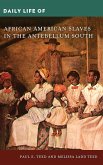It is difficult for twenty-first-century Americans to imagine life in the South over two hundred years ago. What were the daily routines and popular beliefs of ordinary people? What did they do for fun? How did contacts between Europeans, Native Americans, and Africans alter patterns of work, family life, material culture, and food; change religious beliefs; and fashion new social identities? When did people in the colonial South identify as "southerners"? Daily Life in the Colonial South is the first major synthesis of the social history of the southern colonies that examines these questions. John T. Schlotterbeck describes how social interactions between Native Americans, Europeans, and Africans from initial contacts with Europeans in the early 1500s to the eve of the American Revolution in the 1760s created new societies. Indigenous people and newcomers adapted inherited cultures, institutions, and social patterns to novel settings from the Chesapeake Bay to the Lower Mississippi River and the Native interior. Over time, new ways of living, behaving, and believing developed across diverse and changing physical, demographic, economic, and social environments. Schlotterbeck's examination of everyday life encompasses both private lives and public actions of all members of society: women and men, blacks and whites, Native Americans and Europeans, and common folk and gentry.
Hinweis: Dieser Artikel kann nur an eine deutsche Lieferadresse ausgeliefert werden.
Hinweis: Dieser Artikel kann nur an eine deutsche Lieferadresse ausgeliefert werden.








